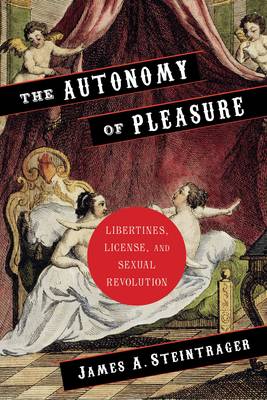
Stock image for illustration purposes only - book cover, edition or condition may vary.
The Autonomy of Pleasure: Libertines, License, and Sexual Revolution
James Steintrager
€ 91.03
FREE Delivery in Ireland
Description for The Autonomy of Pleasure: Libertines, License, and Sexual Revolution
Hardback. Series: Columbia Themes in Philosophy, Social Criticism, and the Arts. Num Pages: 40 pages, 40 illustrations. BIC Classification: 1DDF; 3JF; HPN; JFC; JHBK5. Category: (P) Professional & Vocational. Dimension: 229 x 152. .
What would happen if pleasure were made the organizing principle for social relations and sexual pleasure ruled over all? Radical French libertines experimented clandestinely with this idea during the Enlightenment. In explicit novels, dialogues, poems, and engravings, they wrenched pleasure free from religion and morality, from politics, aesthetics, anatomy, and finally reason itself, and imagined how such a world would be desirable, legitimate, rapturous-and potentially horrific. Laying out the logic and willful illogic of radical libertinage, this book ties the Enlightenment engagement with sexual license to the expansion of print, empiricism, the revival of skepticism, the fashionable arts and lifestyles of the Ancien Regime, and the rise and decline of absolutism. It examines the consequences of imagining sexual pleasure as sovereign power and a law unto itself across a range of topics, including sodomy, the science of sexual difference, political philosophy, aesthetics, and race. It also analyzes the roots of radical claims for pleasure in earlier licentious satire and their echoes in appeals for sexual liberation in the 1960s and beyond.
Product Details
Publisher
Columbia University Press
Format
Hardback
Publication date
2016
Series
Columbia Themes in Philosophy, Social Criticism, and the Arts
Condition
New
Weight
695g
Number of Pages
408
Place of Publication
New York, United States
ISBN
9780231151580
SKU
V9780231151580
Shipping Time
Usually ships in 15 to 20 working days
Ref
99-15
About James Steintrager
James A. Steintrager is professor of English, comparative literature, and European languages and studies at the University of California, Irvine.
Reviews for The Autonomy of Pleasure: Libertines, License, and Sexual Revolution
The Autonomy of Pleasure is an important work that adds richly to our understanding of libertine literature in eighteenth-century France and, more generally, of the culture of pleasure that emerged in aristocratic and leisurely social circles. James A. Steintrager's interpretation of libertinage is innovatively different from existing scholarship, weaving suggestively and cogently between the eighteenth-century context and the present.
Daniel Brewer, University of Minnesota Steintrager's provocative and insightful book is an original, wide-ranging, well-argued, and substantive contribution to the field that successfully conjoins theoretical debates with current historical and literary scholarship. It is, moreover, engagingly and intelligently written-a pleasure to read.
Lynn Festa, Rutgers University Steintrager's original and persuasive study of the Marquis de Sade and the uses of Sade will be as stimulating to historians of sexuality, sex, and sexology as it will be to scholars and students of eighteenth-century French literature. The Autonomy of Pleasure will also appeal to historians of visual culture with its excellent reproductions of eighteenth-century engravings, surrealist photographs, and movie stills.
Kate Tunstall, University of Oxford Finally, a book that commands the intelligence and the erudition to tackle the thorny topic of libertinage. Steintrager gives its due to the French Enlightenment in the radicalization of pleasure under all its guises. But his book takes us from classical antiquity all the way to the sexual revolution of the sixties. We travel from Ovid to the infamous Marquis de Sade, who makes recurring appearances, to Foucault. A resounding critical exploit on a still intriguing topic and a bold assessment of the pitfalls of the discourse of sexuality.
Pierre Saint-Amand, Brown University
Daniel Brewer, University of Minnesota Steintrager's provocative and insightful book is an original, wide-ranging, well-argued, and substantive contribution to the field that successfully conjoins theoretical debates with current historical and literary scholarship. It is, moreover, engagingly and intelligently written-a pleasure to read.
Lynn Festa, Rutgers University Steintrager's original and persuasive study of the Marquis de Sade and the uses of Sade will be as stimulating to historians of sexuality, sex, and sexology as it will be to scholars and students of eighteenth-century French literature. The Autonomy of Pleasure will also appeal to historians of visual culture with its excellent reproductions of eighteenth-century engravings, surrealist photographs, and movie stills.
Kate Tunstall, University of Oxford Finally, a book that commands the intelligence and the erudition to tackle the thorny topic of libertinage. Steintrager gives its due to the French Enlightenment in the radicalization of pleasure under all its guises. But his book takes us from classical antiquity all the way to the sexual revolution of the sixties. We travel from Ovid to the infamous Marquis de Sade, who makes recurring appearances, to Foucault. A resounding critical exploit on a still intriguing topic and a bold assessment of the pitfalls of the discourse of sexuality.
Pierre Saint-Amand, Brown University
